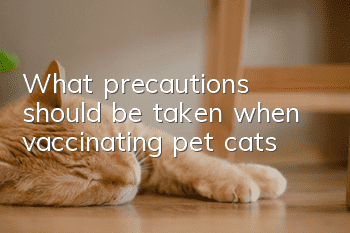What precautions should be taken when vaccinating pet cats?

With the advancement of medical technology, people’s research on pathogenic bacteria has become more and more thorough, and some vaccines that can prevent certain diseases have also come into people’s sight. This widely used technology not only benefits mankind, but also For the benefit of cats, we can prevent some diseases that cats are susceptible to through vaccination.
1. Which vaccines do cats need?
1. Feline triple vaccine is an imported feline distemper vaccine. It is a universal product internationally and can prevent feline distemper (feline panleukopenia), feline calicivirus infection and infectious rhinotracheitis.
Immunization method: Cats over 2 months old need to be vaccinated (intramuscular injection) twice, with an interval of 2 to 3 weeks; thereafter, the vaccination will be once a year. This vaccine is currently clinically proven to be effective.
2. There are two types of rabies vaccines, domestic and imported, used to prevent the occurrence of rabies.
Immunization method: Cats over 3 months old can be vaccinated. The protection period is 1 year and should be vaccinated once a year. From the clinical effect point of view, both imported and domestic rabies vaccines have better effects.
3. Domestic cat two-part vaccine to prevent feline distemper and rabies.
2. Precautions for vaccination
How to confirm that a cat is in a healthy state? Under normal circumstances, veterinarians should perform a clinical physical examination on the cat, including body temperature, respiration, heartbeat rate, physical examination and medical history inquiry. The normal body temperature of kittens is 38~38.5℃, and that of adult cats is about 38.0℃, but it should not exceed 38.7℃, unless individual cats have just come out of a stuffy car, the body temperature may be slightly higher. The physical examination mainly observes whether there are eye secretions and nasal discharge, whether the color of the oral mucosa is abnormal, whether there are proliferated blood vessels in the conjunctiva, whether there is vomiting, not eating, diarrhea, etc., whether there is a history of infectious diseases, and whether there is contact with sick cats. Pass.
Secondly, after vaccination, there is a certain protection rate, but the protection rate is not 100%. This shows that when the immunity of vaccinated cats decreases, they may also contract infectious diseases if they come into contact with sick cats.
Third, it takes about 7 days after vaccination to produce a certain amount of antibodies and provide a certain level of protection for cats; therefore, cats that have just been vaccinated for 1 to 3 days are not in a safe period, and the effect of the vaccine is not fully reflected. .
Fourth, cats that have been injected with serum need about 20 days before they can be vaccinated. This is because the serum (containing certain antibodies) takes a certain amount of time to disappear from the body or drop below a certain level.
Fifth, cats that are in the incubation period of diseases (such as feline distemper) do not become ill at the time, but will become ill within 1 to 7 days after vaccination and should be treated.
Sixth, normal vaccination, should be done once a year. You cannot think that the cat will not be vaccinated if it does not go out of the house, or that it is safe after 2 to 3 vaccinations, and it is okay not to vaccinate in the future. This will provide opportunities for the spread of the virus, because the cat owner is Those who want to come into contact with the outside world may be one of the infectious vectors.
In addition, the vaccine is a biological product, and some cats may occasionally experience allergies after vaccination. Therefore, after the cat is vaccinated at the animal hospital, you should stay for about 10 minutes to observe whether there are any abnormal changes in breathing, heart rate or even shock. If there is any, please ask a veterinarian for timely treatment.
It is best not to take a shower within 1 week after vaccination to prevent colds caused by over-coldness or overheating, which may affect the immune effect, or infection caused by contaminated needle holes. Individual cats with poor immunity. You should be careful because you will not be able to produce enough antibodies after being vaccinated.
Many people will vaccinate their cats at home, and most of them will have no problems. However, a small number of cats will be allergic to vaccines, so it is not recommended to vaccinate cats at home.
- How to breed Chinchilla
- What should the owner do if the cat has a bad temper?
- How to choose cat food
- What kind of cat is Douyin Nemo?
- What should I do if my cat’s eye droppings are red?
- Why do cats like to sleep next to the toilet?
- What will happen if the cat litter is not changed?
- Are Ragdoll cats afraid of heat?
- Cat vomits a puddle of water with foam
- Can cats eat sea cucumbers?



